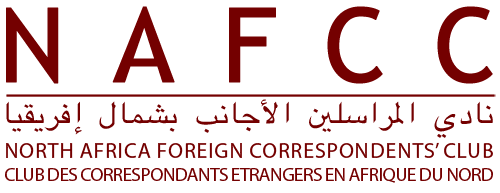Le NAFCC exprime une nouvelle fois son inquiétude devant la pression grandissante à laquelle sont soumis les journalistes étrangers travaillant à Tunis et condamne l’interpellation de deux journalistes.
Le dernier incident en date s’est produit lundi 15 janvier, alors que Talel Nacer, vidéaste pour l’agence de presse Anadolu Agency, et son collègue photographe Enes Canli, tous deux dûment accrédités par les autorités tunisiennes, couvraient le 99ème anniversaire du club de football Espérance de Tunis, dans le quartier de Bab Souika à Tunis. Nacer Talel détient également une autorisation de filmer délivrée par les services de la communication de la présidence du gouvernement. The NAFCC one again expresses its deep concerns over the growing pressure on foreign journalists working in Tunis and condemns the arrest of two journalists.
The latest incident happened on Monday, 15th January, when Nacer Talel, videographer for Anadolu Agency and his photographer colleague Enes Canli, were covering the Football Club Esperance’s 99th anniversary in the Bab Souika district of Tunis. Both journalists are fully accredited with the Tunisian authorities and Nacer Talel also holds a filming license issued by the communication services of the government presidency press office.
Interpellés à 19h15 dans une ruelle du quartier par des policiers en civil refusant de décliner leurs identités, ils signalent directement qu’ils sont journalistes, dûment accrédités. Les policiers reprochent alors à Enes Canli de ne pas avoir les autorisations nécessaires pour faire des photographies et décident d’emmener au poste de police de Bab Souika les deux journalistes. Si l’échange est resté courtois, les policiers demandent à visionner puis à supprimer les photographies. Enes Canli a dû signer le registre d’intervention de la police avant que les deux journalistes puissent sortir à 19h55.
Les incidents de ce lundi surviennent au lendemain de l’interpellation du correspondant de RFI Michel Picard par la Garde Nationale alors qu’il couvrait la visite du président tunisien à Ettadhamen, au nord-ouest de Tunis. Conduit au poste local de la Garde nationale, le journaliste avait dû signer un document en arabe, sans traduction officielle, avant d’être autorisé à partir.
Ils surviennent également quatre jours après la convocation du journaliste indépendant Mathieu Galtier par la Garde Nationale du Bardo à Tunis, où il a été prié de révéler l’identité de ses sources, exigence contraire aux standards internationaux régissant la liberté de la presse.
Le NAFCC a pris note de l’assurance fournie, mardi 16 janvier, par les services du Premier ministre que le gouvernement demeure attaché au respect de la liberté de la presse en Tunisie et des conditions de travail des correspondants étrangers. Le NAFCC attend toutefois des actes concrets et que les procédures en vigueur soient respectées sur le terrain par les forces sécuritaires. Tout journaliste doit pouvoir exercer librement son travail, a fortiori s’il est détenteur d’une carte de presse de correspondant accrédité. Les vérifications doivent pouvoir s’effectuer sur le lieu du reportage sans qu’il soit nécessaire de recourir à la pratique coercitive d’interpellations.
Le NAFCC exhorte à nouveau les forces de sécurité tunisiennes à respecter les procédures en vigueur conformément aux engagements pris par les autorités tunisiennes elles-mêmes.
They were stopped at 7.15pm in Bab Souika by plain clothes police officers who refused to reveal their identities. Both Mr. Talel and Mr. Canli told the officers that they were fully accredited journalists. The police chastised Enes Canli for not having the necessary authorization to take photographs before deciding to escort both journalists to Bab Soukia police station. Despite the conversation at the police station being civil in nature, the police did ask Mr. Canli to see his photographs and to delete them. Before being allowed to leave the police station at 19:55hrs Enes Canli had to sign the police intervention log.
This incident follows the detention on Sunday 14th January of RFI (Radio France Internationale) correspondent Michel Picard (a French National) by the National guard whilst he was covering a visit by the President of Tunisia to the district of Ettadhamen in north-west Tunis. Mr. Picard was taken to the local National Guard station and before he was allowed to leave he was asked to sign a document in Arabic and was not given an official translation in French.
Four days prior to this, independent journalist Mathieu Galtier was summoned to the Bardo National Guard office in Tunis, where he was asked to reveal the identities of his sources, this request is contrary to the international standards governing freedom of the press.
The NAFCC notes the assurances provided by the Prime Minister’s Office on Tuesday, 16th January, that the Tunisian government remains committed to respect the freedom of the press in Tunisia and the working conditions of foreign correspondents. The NAFCC, however, expects to see concrete actions to ensure that the procedures and respect is observed by police and security forces. Every journalist must be able to work freely, especially if he/she holds a press card issued by the government. The verifications must be carried out at the place of enquiry without resorting to arrest and detaining any journalist at a police station nor should they use coercive practice of arrests.
The NAFCC again calls upon the Tunisian security forces to respect the procedures in accordance with commitments to press freedom as laid out by the Tunisian authorities
